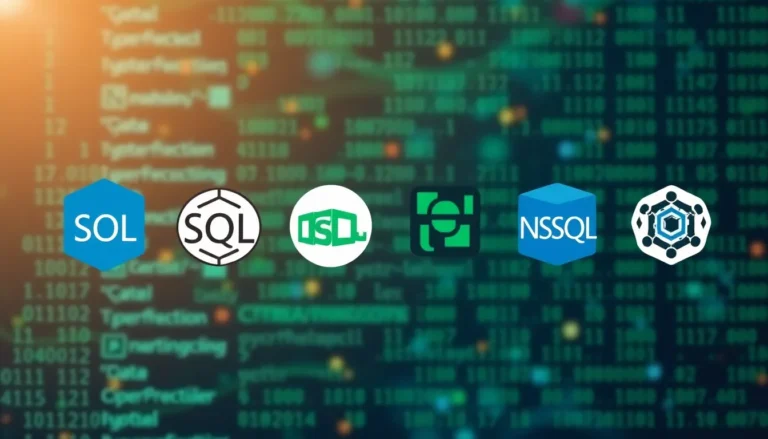In the ever-evolving world of marketing technology, staying ahead of the curve is like trying to catch a greased pig at a county fair—challenging but oh-so-rewarding. As brands scramble to harness the latest tools and trends, the martech landscape is growing more complex and exciting. From AI-driven analytics to automation that makes coffee (well, almost), marketers must navigate this dynamic terrain with finesse.
The 2024 martech outlook promises a rollercoaster of innovations that could transform how businesses connect with their audiences. It’s not just about keeping up; it’s about leveraging these advancements to outsmart competitors and deliver unforgettable customer experiences. Buckle up as we dive into the trends shaping the future of marketing technology and discover how they can elevate brands to new heights.
Overview of Martech Outlook
Martech continues to evolve, presenting brands with new opportunities and challenges. Companies increasingly adopt AI-driven tools, optimizing customer interactions and improving engagement. Strategies focusing on personalization and data-driven decisions drive success.
Innovative technologies transform how businesses analyze market trends and consumer behavior, enabling real-time insights and adjustments. Brands that invest in automation streamline operations, reducing manual tasks while increasing efficiency. The 2024 landscape will see greater emphasis on integrated solutions that unify customer data across multiple channels.
Emerging trends such as voice search optimization, augmented reality, and predictive analytics shape marketing strategies. Organizations seeking competitive advantages leverage these advancements to enhance customer experiences. Simplified user interfaces allow brands to adopt martech tools more readily, promoting usability among team members.
Analytics continue to take center stage, offering deep insights into consumer preferences and behavior changes. Leveraging these insights helps create targeted campaigns that resonate with audiences. Furthermore, as privacy concerns grow, companies adapt their strategies to maintain compliance while still gathering valuable customer data.
Direct-to-consumer models gain traction, requiring brands to rethink their engagement strategies. Personal touches and authentic messaging become critical in building trust. Businesses that prioritize these elements stand out in a crowded marketplace.
As the martech landscape evolves, ongoing education and adaptation are crucial. Professionals staying updated on the latest tools and best practices will ensure their organizations remain competitive. Future-focused planning and strategic foresight will be essential in navigating the dynamic world of marketing technology.
Key Trends in Martech

Martech is evolving rapidly, with several trends gaining momentum as brands adapt to a shifting landscape. Companies now emphasize the integration of advanced technologies that enhance marketing efforts.
Data-Driven Decision Making
Data-driven decision making plays a vital role in marketing strategies. Brands leverage real-time analytics to gather insights into consumer behavior. These insights enable marketers to tailor campaigns more effectively. Companies using predictive analytics see improved performance metrics. Market research increasingly relies on quantifiable data, allowing businesses to fine-tune their approaches. The capacity to analyze vast amounts of data leads to informed, actionable strategies. Analytics platforms provide dashboards that simplify data interpretation. Reliable sources, such as Gartner and McKinsey, highlight this trend’s growing importance.
Personalization and Customer Experience
Personalization enhances customer experience significantly. Most consumers expect brands to understand their preferences and needs. Tailored messaging leads to greater engagement and loyalty. Brands using AI-driven technologies create individualized customer journeys. Real-time data helps marketers adapt their strategies to suit varying demographics. Engaging with customers through personalized content fosters a deeper connection. Using behavioral data allows companies to deliver relevant promotions. Research from Epsilon emphasizes that personalized experiences result in increased conversion rates.
Emerging Technologies in Martech
Martech continues to evolve with innovative technologies that transform marketing strategies. The integration of emerging technologies offers brands new ways to engage with customers more effectively.
Artificial Intelligence and Machine Learning
Artificial intelligence (AI) enhances marketing efforts by analyzing large datasets for valuable insights. Machine learning algorithms identify consumer behavior patterns, allowing for tailored messaging. Brands adopting AI-driven technologies benefit from predictive analytics, which improves targeting and personalization. Real-time adjustments to campaigns result from continuous data analysis. Marketers can leverage AI to automate content generation, optimizing audience engagement at scale. Success increasingly relies on integrating AI into decision-making processes, enabling brands to stay ahead of trends and adapt their strategies accordingly.
Automation Tools and Solutions
Automation tools streamline repetitive marketing tasks, increasing team efficiency. By automating email sequences and social media posting, brands can focus on strategic initiatives and creative development. These solutions help maintain consistent communication with customers, nurturing leads through targeted messaging. Advanced marketing platforms incorporate analytics to measure performance and refine automation strategies. Utilizing automation tools not only saves time but also increases the effectiveness of campaigns. As marketers embrace automation, the emphasis on integrating these tools with other systems becomes crucial for a cohesive approach to managing customer relationships.
Challenges in the Martech Landscape
Brands encounter multiple challenges as they navigate the evolving martech landscape. Integrating diverse platforms is one significant hurdle.
Integration of Diverse Platforms
Businesses face complexities when merging various marketing technologies. Multiple tools often lead to siloed data and inconsistent customer experiences. To combat these issues, many organizations prioritize unified solutions that streamline data flow. Standardizing tools promotes seamless collaboration across teams. As brands adopt integrated platforms, they enhance their ability to deliver personalized experiences and real-time insights. Alignment among disparate systems directly influences marketing effectiveness.
Privacy and Data Security Concerns
Privacy and data security concerns pose additional challenges in the martech environment. Regulatory compliance, like GDPR and CCPA, requires brands to adapt their data collection practices. Organizations must invest in secure systems to protect sensitive customer information. Failing to address these concerns can lead to significant reputational damage and legal repercussions. Balancing data utilization with privacy protection becomes essential for fostering consumer trust. Developing transparent communication strategies also helps to reassure customers about data usage and security practices.
The martech landscape is set for transformative changes as brands embrace innovative technologies and strategies. By prioritizing data-driven decisions and personalization, organizations can enhance customer engagement and build stronger relationships. The focus on integrated solutions will streamline operations and foster collaboration, ensuring brands remain agile in a competitive environment.
As emerging trends continue to evolve, staying informed and adaptable will be crucial for success. Brands that invest in AI-driven tools and prioritize privacy compliance will not only navigate challenges but also seize opportunities for growth. The future of martech promises exciting advancements that can redefine how businesses connect with their audiences.






